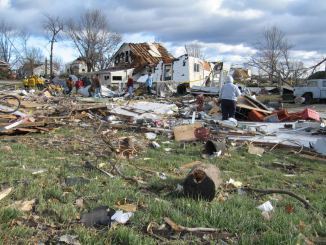The impossible lesson of empathy
 The expression “Hurt people hurt people” could have been written about my life. One of the reasons I know I still need Jesus is because there are times during intense grief when it feels good to bring others down with me. I’m not proud of this. I make no attempts to justify it. I’m just admitting that I do it.
The expression “Hurt people hurt people” could have been written about my life. One of the reasons I know I still need Jesus is because there are times during intense grief when it feels good to bring others down with me. I’m not proud of this. I make no attempts to justify it. I’m just admitting that I do it.
I lost two friends over fights I picked recently. The first was when an acquaintance told me that God protected his home during a storm. Other people on his street experienced varying degrees of property damage, but not this guy. If I wanted to respond tactfully, I could have suggested it was more likely that, in nature’s random, non-agenda-driven way, the storm just didn’t travel a path in which his house was a target. But that wasn’t a remote possibility for him: God protected his home. I told him, without trying to hide my spite at all, “Isn’t it funny that the people who believe in the prosperity gospel are the ones who benefit from it?”
The other instance was a friend who bragged that God provided her a new house: not a realtor, not the buyer of the home she was trying to sell. I had to ask why God provided her – someone with no shortage of monetary means – with a home, but not, say, an actual homeless person.
That’s the thing about these “providence” stories. When I hear them, I’m not going to feel encouraged and inspired, as the story teller wants me to feel. Instead I’m going to be wondering about all the other people in need of blessings and miracles; people who live on the streets and subsist only on the kindness of strangers. People who lost pieces of property in a storm that they can’t afford to replace. But the ultimate question of all is, rather than protect select people in these storms, why doesn’t God just prevent them from happening in the first place?
“God’s ways are just higher than ours” isn’t a satisfactory response anymore. I can’t take it seriously from people who claim to benefit from those “mysterious ways” while the rest of us are left floundering for things we still need. It doesn’t matter to me anymore that people generally mean well when they say these things. I only hear the unspoken implication that they are favored in ways that other people are not. I’ve heard stories of how God healed people with conditions just like my father’s because they prayed hard enough, which strongly implies that people like my dad didn’t have enough value to be worth saving. I don’t believe that, but that’s what I hear.
That’s why I bristle when I hear these stories, which I’ve heard in just about every church group I’ve been to over the last few years. That’s why I can’t help but think to myself, you are not a safe person for me to share my story with whenever I hear one. Maybe that’s unfair, but it’s an emotional risk I just can’t afford to take.
I received an email from a family acquaintance two weeks before Dad died, asking if he had accepted Jesus as his savior so he could go to heaven: the unmentioned implication being, of course, that no Jesus meant no peace after death, but only more suffering. That email pushed me into one of the worst anxiety attacks I’ve ever had. In my mind, the people who think nothing of asking a stranger if a sick relative has been saved are the same kind of people who don’t understand what’s so hurtful about these “miracle” stories. They are the same people who might not understand why I don’t find the platitudes comforting, and might even find it offensive that “Because God said so” isn’t enough for me. Not if I can’t understand why.
That’s an unfair generalization to make about people who just want to be helpful, but grief isn’t known for being rational and reasonable. It’s not a permanent excuse to get off the hook for lashing out, but sometimes the walls it builds can be helpful. At this still-fragile point when it hasn’t been a full year since I lost my father, those walls keep me from revealing too much to people who aren’t ready to hear or understand.
But one benefit of letting down those walls is allowing the grief to thaw one’s heart enough to understand that people who say those hurtful things likely haven’t experienced the same hurts in life, and if they have, they might come to different spiritual conclusions about them. If they truly believe that God protected them in a plane crash that killed everyone else on board, is it right to try and take that hope from them? Is it cruel to judge it and tear it to pieces?
Judaism taught me that no one is immune to suffering; that there is often no conceivable reason for it, and to give credit where it is due: to doctors, rescue teams, people in public service. Christianity is teaching me empathy for those who are lucky enough to have never suffered too deeply, and for those who process pain differently than I do. It’s a one-step-forward-two-steps-back kind of lesson, but I give myself points for at least acknowledging that I need to learn it. And admitting you have a problem is the first step toward correcting it, so I’ve heard.
Filed under: Religion Tagged: cancer, Christian culture, Christianity, Controversy, depression, evangelicals, First World Problems, grief, Judaism











